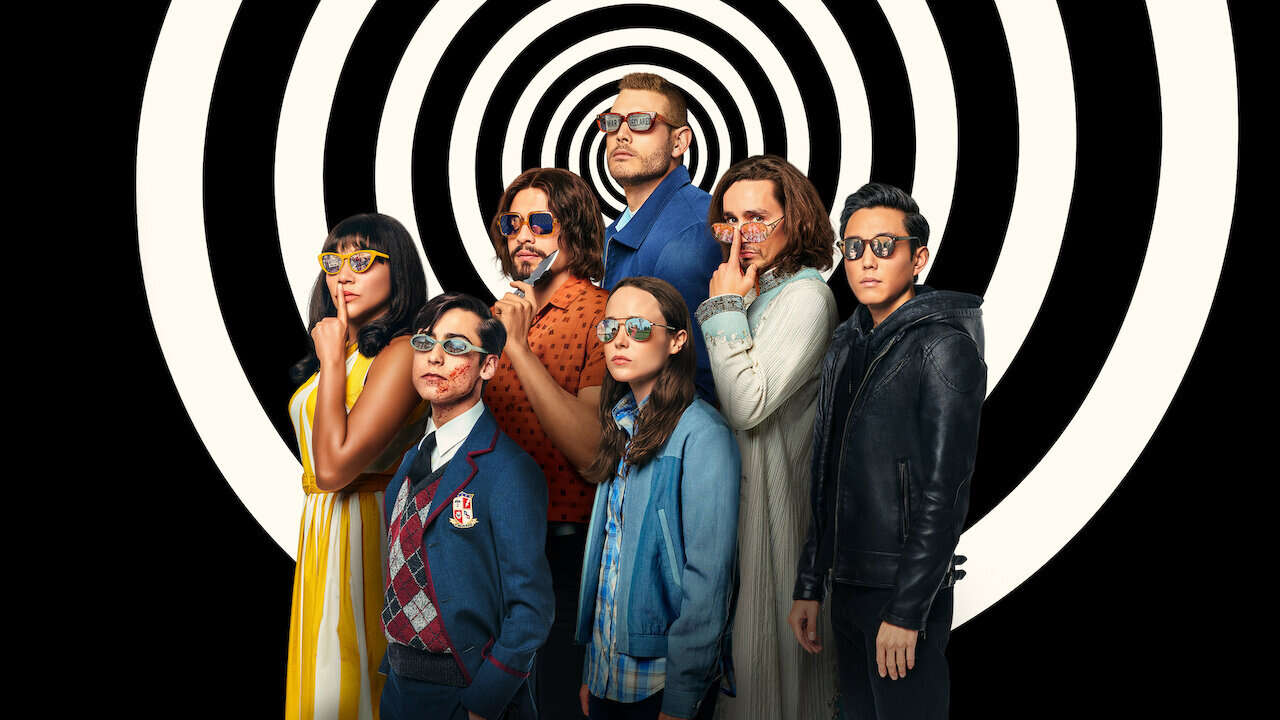
Netflix’s quirky superhero franchise, The Umbrella Academy, is entering its third season, where it is primed to introduce another team of heroes, the resurrection of a long-dead character, and yet another universe-ending, time-traveling catastrophe. Following the events of Season 2, the Umbrellas have found themselves back in the modern day, but their home has been taken over by an alternate version of them–the Sparrow Academy–brought into existence by a paradox created by their father, Reginald. To make things worse, the paradox that replaced them is very rapidly spinning out of control, threatening the universe in a series of escalating disappearances that will eventually consume reality itself.
Put plainly, Umbrella Academy Season 3 has a lot going on–and while the higher concept sci-fi conceits are certainly par for the course in the show, there’s more of them overlapping than ever before, and there are more characters in play to keep track of this time around, making this season feel bigger and busier than ever. Unfortunately, this new size and scale also means that Season 3 has a few too many ideas, and no real way to pay them all off.
On the positive side, Umbrella Academy’s secret to success has always been its cast–and every major player has returned. The Hargreeves family, Luthor (Tom Hopper), Diego (David Castañeda), Viktor (Elliot Page), Five (Aidan Gallagher), Klaus (Robert Sheehan), Ben (Justin H. Min), and Allison (Emmy Raver-Lampman) are all back, alongside Season 2 newcomer Lila (Ritu Arya) and their adoptive father, Reginald (Colm Feore). The dysfunctional family dynamic has served Umbrella Academy in the past, and it continues to do so now–unsurprisingly, the chemistry between the cast has only gotten stronger and the performances have only gotten better. Alongside the Hargreeves troupe are the newly introduced Sparrows, a brand new crew of superheroes with bizarre powers. Ben, interestingly enough, is one of them, following his recent resurrection (long story) giving Min a chance to shake up the audience’s expectations for his character, who until now, has been a very put-upon ghost only Klaus can see.
The Sparrows themselves are all immediately interesting, but the vast majority of them are wildly underserved by the story. Only Ben, the crow-manifesting Fei (Britne Oldford), the gravity-manipulating Sloane (Genesis Rodriguez), and a fully CGI cube who speaks in wingdings named Christopher get any real screen time–and of this group, only Ben and Sloane carry any real narrative weight. The Sparrows are the first and most obvious casualty of Umbrella Academy’s overwrought ambition this season, which is really a shame, considering how engaging and funny they are from the jump.
But even benching the newly introduced characters almost as fast as they’re put on screen doesn’t really serve to help the overcrowding of the season. It’s not that Umbrella Academy has ever been restrained by any means, but in Season 3, there is a decidedly disjointed feeling between each of the subplots and sidequests. Allison wants to figure out a way to get back to a timeline where she had a family, Luthor wants to find love, Diego is trying to figure out how to navigate a relationship with a boy Lila claims is his son, Five wants to retire, Klaus wants to find his birth parents, and Viktor is dealing with some uncomfortable truths about his own past as a familiar face comes back to haunt him.
The family drama is, as always, a major element here–and some of it does work well. There’s a refreshing level of honesty in the fights and arguments the Hargreeves siblings have, and it’s nice to see a superhero show attempt to acknowledge that the trauma of the heroes’ experiences isn’t actually fixed by saving the day. However, about midway through Season 3’s 10-episode run, the conflicts between the characters begin to slide from honest and relatable to frustrating and flat out cruel. By the end of Season 3, it’s very difficult to find anyone in the ensemble to really root for–they’re either too bogged down in their own grief and anger to be anything but spiteful and mean or too doped up on selfish hope that they’re unable to see past their own self interest. No one seems interested in actually learning any of the lessons that have been covered in the last two seasons, and instead are only able to carry the scars they’ve collected.
Things get even more complicated when plot device after plot device is dropped on their heads, bogging down the potential for growth and change with the urgency of the impending apocalypse. It becomes increasingly difficult to remember who is mad at whom and why, who is undermining and who is being undermined, who is lying and who is being lied too. Concepts and ideas are brought up and then never paid off–at one point, the Sparrow’s version of their robot “Mom,” Grace, who was last seen in Season 1 has a whole riff about apocalyptic religion that almost (but never really) becomes a comment on evangelicalism, for example. There’s another running side plot with Diego and his possible son that tee’s up another story, but leaves the maybe-son jettisoned and forgotten altogether.
This lack of follow through and focus leaves Season 3 feeling frantic and unpolished more often than not. The areas of the season that work–like the surprisingly heartfelt and funny acknowledgements of Viktor’s transition, the playful self awareness and genre tropes, or the handful of charmingly quirky fight scenes and dance battles fans have come to expect–are all still lovable and worthwhile, but the finished product is not as strong as the seasons that have come before it.
Source: GameSpot


